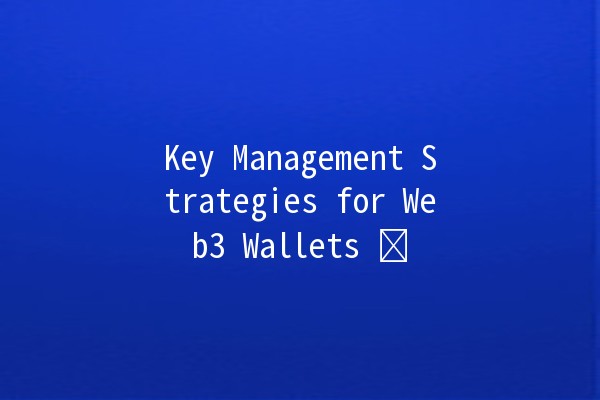
In the rapidly evolving world of Web3, the importance of security and management of private keys cannot be overstated. As decentralization shifts the paradigm of digital ownership, understanding how to manage private keys effectively becomes paramount for both seasoned investors and new users. This article delves into various practical strategies for Web3 wallet private key management, offering actionable tips to enhance security.
Understanding Private Keys in Web3
Before diving into specific key management techniques, it's vital to grasp what private keys are and their role in Web

One of the most effective private key management methods is the utilization of hardware wallets.
Explanation:
Hardware wallets store private keys offline, significantly reducing the risk of cyberattacks. Because they are not connected to the internet, they are less susceptible to hacking attempts and malware.
Practical Application:
Example: Devices like Ledger and Trezor provide robust security features, allowing users to manage their private keys safely. Users can back up keys onto these devices and perform transactions with a greater level of assurance that their private keys are secure.
Multisignature (multisig) wallets require multiple private keys to authorize a transaction, enhancing security by adding an additional layer of authentication.
Explanation:
This method mitigates the risk of a single point of failure. If one key is compromised, the assets remain secure as multiple other keys are needed to conduct any transaction.
Practical Application:
Example: A group of friends wanting to comanage a communal fund can set up a multisig wallet requiring, say, three out of five signatures for transactions. This prevents unauthorized spending and increases accountability.
Backups are crucial to preventing loss of access to your wallet.
Explanation:
Regularly backing up your private keys ensures that you have multiple copies stored in different secure locations. If your primary storage is lost or compromised, you'll still have access to your funds.
Practical Application:
Example: Create encrypted digital copies of your private keys and store them on different devices and external hard drives. Alternatively, write down and physically secure your keys in a safe place, like a safe deposit box.
Using a secure password manager can enhance the management of passwords associated with wallet access while protecting private keys.
Explanation:
Password managers encrypt and securely store your login credentials, which can be leveraged to enhance security when accessing Web3 wallets.
Practical Application:
Example: Password managers like Bitwarden or LastPass allow you to store wallet credentials securely. These services utilize encryption to ensure that even if the storage method is compromised, the data remains secure.
Awareness of potential threats can significantly enhance the security of your wallet.
Explanation:
Understanding phishing attacks, malware, and other common threats helps users to recognize suspicious activities, protecting their assets.
Practical Application:
Example: Join online forums or groups focused on Web3 security and keep updated on emerging threats. Organizations like the Web3 Foundation frequently share best practices and recent security alerts that can help you stay vigilant.
Frequently Asked Questions
What happens if I lose my private key?
Losing a private key effectively means losing access to the related wallet and its assets. Unlike traditional banking systems, there is no recovery service for lost keys in the decentralized world. This emphasizes the importance of secure key management practices.
Can I recover my assets without a backup of my private key?
If you do not have a backup of your private key, it is almost impossible to recover your assets. This is why regular backups of private keys and using secure methods such as mnemonic phrases during wallet creation are recommended.
What is the best way to create a strong private key?
A strong private key is typically generated randomly and comprises a combination of letters, numbers, and symbols. Using trusted wallet software that follows best practices in encryption can ensure the generation of strong private keys.
Is it safe to store my private key on my computer?
Storing private keys on a computer poses risks, especially if the device is connected to the internet. It is safer to use hardware wallets or secure offline storage solutions for managing private keys.
What should I do if I suspect my private key has been compromised?
Immediately transfer your assets to a new wallet with a different private key if you suspect a compromise. This is the fastest way to safeguard your funds.
How often should I update my private key management practices?
It’s wise to review and update your private key management practices periodically, particularly as new threats emerge and as you acquire new assets. Staying informed about best practices and evolving technologies is crucial in maintaining security.
, while the landscape of Web3 offers incredible possibilities, it also presents significant risks related to private key management. Employing robust strategies such as hardware wallets, multisignature setups, regular backups, and ongoing education can empower users to interact confidently within this decentralized realm. By remaining proactive and informed, you can not only protect your assets but also enjoy the full advantages of what Web3 has to offer.

